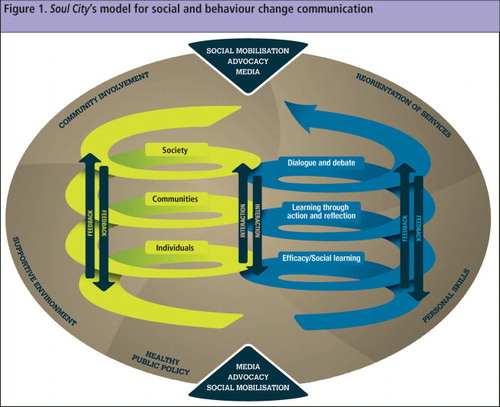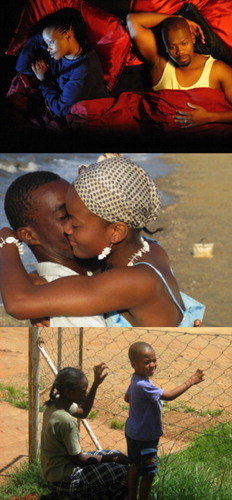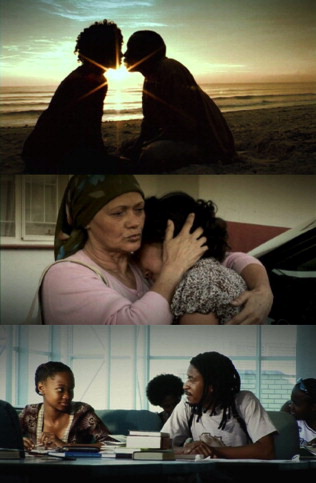Soul City Institute for Health and Development Communication
The Soul City Institute for Health and Development Communication (SCI) is a South African NGO and the largest social and behaviour change communication project in Africa. Social and Behaviour Change Communication (SBCC) is the systematic application of interactive, theory-based, and research-driven communication processes and strategies that go beyond individual behaviour change approaches to also address the social and structural drivers of unhealthy behaviours. Using a combination of mass media, social mobilisation and advocacy, the SCI aims to improve the quality of life and health of people in Southern Africa through strengthening individuals, communities and society based on active citizenship and principles of health equity and social justice.
The SCI model and methodology
SCI does not view change as a simple or linear process that only affects individuals. Rather, it views behaviour as the product of interactions between components of a complex system, consisting of many sub-systems such as cultural, socio-economic and political realities. Its model is a socio-ecological model that recognises change in one part of the system is related to change in a different part of the system through the process of feedback. The SCI interventions aim to raise awareness, shift social norms and support healthy behaviour through facilitating and strengthening dialogue and debate, action and reflections, social learning and efficacy. The overarching goal of Soul City's work is to create supportive environments, build healthy public policy, contribute to the reorientation of services, facilitate community involvement, and build personal skills and healthy choices as outlined by the WHO Ottawa Charter for Health Promotion, 1986 (www.who.int/healthpromotion/conferences/previous/ottawa/en/).
Using popular culture for social change
Using popular culture is central to the SCI methodology. Often referred to as “edutainment” – where educational and social change issues are woven into popular formats such as radio and television drama series – this methodology has been shown locally and internationally to be a powerful SBCC tool (
). Unlike didactic educational programmes which attract very small audiences and are less persuasive, prime time social television and radio reach and impact upon millions. They have the power to role model, move people emotionally to bring about shifts in attitudes and social norms and to spur people and communities into action. Through a phenomenon known as “parasocial ideation”, audiences often identify very strongly with characters in dramas and experience their life lessons vicariously. Other popular mass media vehicles used by the Soul City Institute include reality, talk and magazine shows, social media and print. These are linked to social mobilisation and community development initiatives on the ground.“Girls at Risk” and “Sexual Networks”
https://www.dropbox.com/s/mzwdviavpgnsds0/Girls%20at%20Risk.wmv
https://www.dropbox.com/s/3977tymxzb5kqzy/Sexual%20Networks.wmv
These two DVDs are packaged as “discussion tools”, designed to be used in community groups to stimulate discussion and debate about sexual reproductive health and rights. They were developed as part of the SCI's Regional HIV Prevention Programme, which began in 2002 as a partnership with DFID, to combine capacity strengthening with SBCC implementation in ten Southern African countries. The Southern African region is shaped by intensive patterns of economic integration and regional migration. Millions of people are connected via migrant labour, transport routes and cultural exchanges, which play a critical role in spreading HIV. Mobility contributes to the spread of HIV in a number of ways. People tend to engage in more high-risk sexual behaviour; people are more difficult to reach for prevention education, condom provision and care and support; and multi-local social networks create opportunities for sexual networking. Beyond porous borders, the Regional Programme's formative research also showed that there were many common social and structural drivers shared by the countries and that stories and characters resonated across countries.
As part of a range of SBCC activities that became part of the partnership's larger OneLove Regional HIV Prevention Campaign, Regional Programme partner organisations collaborated on the making of two sets of films – Untold and Love Stories in a Time of HIV and AIDS. Although a regional series, it is made up of separate local films. Each partner organized one film with its own distinct local voice. The films were produced in local languages, but the series as a whole was sub-titled into English (in Mozambique the whole series was sub-titled into Portuguese). Realising the regional resonance of many issues, Untold and Love Stories aimed to get people across the region talking about how HIV & AIDS affect their communities. Both series were broadcast and screened across Southern Africa. Each edutainment drama was drawn from country-specific, qualitative audience research and each individual script was tested with groups of young people across all countries, to ensure the stories would resonate with them and have the desired impact. The stories engaged with the complexity of personal and social change, integrating social messages into entertaining stories of love and hope, secrets and lies, courage and betrayal in the lives of ordinary people and their communities, to create a popular television series that both moved and entertained its audience.
The films were edited into shorter versions with an accompanying booklet to support discussion. Both discussion tools were developed in collaboration with UNAIDS. The first, entitled Girls at Risk, consists of a 12-minute DVD with extracts from five films in the Untold series, and a discussion booklet, which highlights the risk of ordinary young women and girls in a world of HIV & AIDS and provides advice on ways to use the DVD as a tool to promote dialogue. The second – “Sexual Networks “– consists of extracts from 4 films in the Love Stories series.
Approximately 5,000 guides have been produced and distributed across the region, and are being used in the following settings: clinics, community dialogues, lifeskills training, youth group projects, and a range of other interventions for adults and youth.
The films and discussion tools aimed to:
| • | reach people with authentic local stories that move and entertain | ||||
| • | create dialogue and debate | ||||
| • | get people thinking about their lives and the choices they face in the context of HIV & AIDS | ||||
| • | challenge social norms and values and stimulate actions | ||||
| • | build a community of new voices and grow local skills to develop edutainment drama. | ||||
Dramas for television were chosen because television is recognized as an important vehicle for reaching a mass audience with social change messages. While television's footprint is smaller than that of radio, it is a powerful tool for change, reaching key decision makers. Furthermore, with convergence and new technologies, and through adaptation of the mass media into discussion tools, the reach and impact will expand exponentially in the coming years. The country partners also produced radio dramas, print material and various forms of social mobilisation and policy advocacy as part of the broader OneLove intervention.
Through these series, the Regional Programme also aimed to build and train a community of new voices to write, produce and make local content programmes. The training happened as part of the development process of the campaign. More than 300 people across 10 countries have been trained in key areas of edutainment methodology, research, print, television and radio production and advocacy; as well as management, finance and budgeting. Eleven writers and nine producers from across the region attended an intensive 18-month accredited training course in scriptwritng, edutainment theory and film production. Over 130 technical people benefited from the skills building programme which included camera, lighting, sound and art direction.
An independent multi country study of the One Love campaign, conducted by Tulane University, shows that radio and print media for Soul City had consistently measurable effects across indicators of knowledge, attitude, norms and interpersonal communication. In all countries, there were measurable effects of exposure to the partner interventions on some measures of behaviour change, though effects tended to be more robust for the antecedents to behaviour change: community norms, attitudes, knowledge and stigma reductions. The television specifically was associated with decreased multiple sexual partners in Zimbabwe, increased condom use in Mozambique, and increased HIV testing in Swaziland. All these were statistically significant.Footnote*
Going Viral Against Rape
http://www.youtube.com/watch?v=q2wuY1Bc4qk&feature=share&list=UUjCi2iQkVkXjhDDoF-pOACg
This 45-second made-for-mobile clip was developed by Soul City Institute as part of a response to violence against women and rape in South Africa in general, but also as a focused response to a specific incident. The incident in question involved the filming on mobile phone and subsequent release on the internet of a group of teenagers raping a girl with learning disabilities. The ‘film’ went viral on social media in South Africa. Soul City Institute created “Going Viral Against Rape”, which depicts a scenario of a number of school boys watching a girl being raped on one of their mobile phones. In the end, one of the boys watching realises that the girl being raped is his sister. The mobile movie was posted on You Tube and the Soul City Institute facebook page, as well as on Praekelt Foundation's Young Africa Live platform. This platform has approximately 1. 3 million dedicated users. Within three weeks the mobile clip had received at least 5,000 primary views. Soul City Institute received comments from a range of stakeholders and also unsolicited feedback from individuals in civil society supporting the messaging.
Notes
* External Evaluation of the Southern African Regional Social and Behaviour Change Communication Program (2013) Paul Hutchinson, Jennifer Wheeler, Eva Silvestre, Dominique Meekers, Philip Anglewicz, John Hembling, and Evan Cole, Joe Keating.


